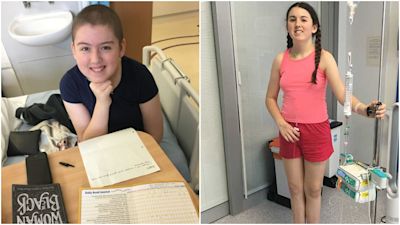Best to check: How back pain turned out to be cancer for one 14-year-old girl

After a fun day out playing laser tag, Alex Newman didn’t expect to come home in excruciating pain.The sharp pain in her back, that her parents put down to down to all the running around she'd done, was in fact a symptom of cancer.The leading cause of death from disease in 13 to 24-year-olds.A year on from her diagnosis, she has joined Teenage Cancer Trust’s #BestToCheck campaign urging young people to look out for symptoms and get support - especially if they feel they can’t because of coronavirus.
There was no gradual build up to Alex’s pain when she came home from a fun day out playing laser tag last year.
The then 13-year-old from from Baginton, in Warwickshire felt an excruciating burning pain in her back which was impossible to ignore.Alex said: “It was so bad it hurt to sit, to stand, to lie down and it kept me up all the way through the night.”Uncertain of how serious the pain was, Alex visited her GP who agreed the intense pain she was experiencing was unusual for someone as active and young as herself.
And after running some tests, she was told to rest up and monitor her symptoms.
Mum Victoria said: “We thought maybe she was tired, maybe over exaggerating it a little bit.”Like any parent would, they gave Alex some paracetamol, a hot bottle and hoped the pain would go away. Her dad even offered tips on looking after her back after suffering from similar aches himself.But a week later she spotted a rash on her legs, arms and neck and developed unusual bruises while at school.
Alex remembered being sent to A&E after turning pale, she said: “I was confused and a bit anxious,“I told one of my closest friends because I just wanted someone to talk to and it was a way to release some of the stress of not knowing.
“As I started getting these symptoms I was thinking ‘what on earth is going on?’”The fact that she knew she hadn’t injured herself and followed doctor’s orders as best she could left her afraid of what was going on.
Alex was diagnosed with Acute lymphoblastic leukaemia (ALL) and fortunately started treatment straight away.
She has spent this year being treated for the rare blood cancer which around 800 people are diagnosed with the each year in the UK.Reaching the maintenance stage - the last phase of ALL treatment - was something Alex envisioned the first discussed her diagnosis with doctors.
But she feels the coronavirus pandemic has slowed her progress.
Alex said: “I feel kind of frustrated because getting to maintenance has been my goal all along so that I can go and do physio and I can go and get back to things I liked doing before.“It kind of feels like I’m back at the beginning.
“Not in terms of treatment wise but in what else I can do.”Many people with cancer in England have been asked to follow extra rules by the government during the second wave of lockdown measures.
Luckily for Alex her cancer treatment has not been affected by the changes and she receives regular chemotherapy.
However, the coronavirus restrictions have put a halt to physio and the activities she heavily relies on to recover.
Alex added: “In maintenance I can go to the gym, I can swim in the pool when I have my line out but I can’t do that because we can’t really go anywhere.
“It feels like your life’s ruled by the numbers that you get back with your blood tests.”
Alex hasn’t been left without support. She has been working with Teenage Cancer Trust since her diagnosis.Pre-lockdown she would meet up with the friends she has made through the charity and spend days out with the team.With most events now held online, Alex has decided to get involved in a different way.She has joined the #BestToCheck campaign encouraging people not to sit on the symptoms and seek help if they think they have cancer.Cancer referrals have been down by as much as 75% across all age groups because of the pandemic, according to The Teenage Cancer Trust.And young people between 13-24 have to visit their GP three times or more before being referred for a consultation.Alex said: “Quite a lot of people don’t know the symptoms and I know that it made me feel worried all the time not knowing what was going on.“Some people may be scared of needles or other tests, but it’s a relief to get the help you need.“It may turn out to be nothing, but if it is cancer then detecting it earlier can help improve the success of the treatment."
The charity hope that getting young people the support early on can prevent conditions from going undiagnosed.Director of Services at Teenage Cancer Trust, Dr Louise Soanes said: “Coronavirus doesn’t stop people getting cancer.“Look out for lumps, bumps or swellings, unexplained tiredness, mole changes, persistent pain and significant weight change.“If you are worried, contact your GP as soon as possible.“Early diagnosis can save lives.”If you're worried about cancer and would like to know more about the signs and symptoms visit www.teenagecancertrust.org/signs